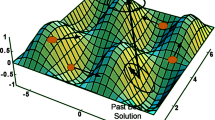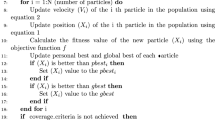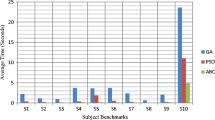Abstract
Software testing is one of the most crucial and analytical aspect to assure that developed software meets prescribed quality standards. Software development process invests at least 50% of the total cost in software testing process. Optimum and efficacious test data design of software is an important and challenging activity due to the nonlinear structure of software. Moreover, test case type and scope determines the quality of test data. To address this issue, software testing tools should employ intelligence based soft computing techniques like particle swarm optimization (PSO) and genetic algorithm (GA) to generate smart and efficient test data automatically. This paper presents a hybrid PSO and GA based heuristic for automatic generation of test suites. In this paper, we described the design and implementation of the proposed strategy and evaluated our model by performing experiments with ten container classes from the Java standard library. We analyzed our algorithm statistically with test adequacy criterion as branch coverage. The performance adequacy criterion is taken as percentage coverage per unit time and percentage of faults detected by the generated test data. We have compared our work with the heuristic based upon GA, PSO, existing hybrid strategies based on GA and PSO and memetic algorithm. The results showed that the test case generation is efficient in our work.
Similar content being viewed by others
References
Ramler R, Wolfmaier K. Economic perspectives in test automation: balancing automated and manual testing with opportunity cost. In: Proceedings of the International Workshop on Automation of Software Test. 2006, 85–91
Grottke M, Trivedi K S.2007._Fighting bugs: remove, retry, replicate, and rejuvenate. IEEE Computer, 2007, 40(2): 107–109
Pargas R P, Harrold M J, Peck R R. Test-data generation using genetic algorithms. Software Testing Verification Reliability, 1999, 9(4): 263–282
Chen X, Gu Q, Qi J X, Chen D X. Applying particle swarm optimization to pairwise testing. In: Proceedings of 34th Annual IEEE Computer Software and Applications Conference, COMPSAC’10. 2010, 107–116
Windisch A, Wappler S, Wegener J. Applying particle swarm optimization to software testing. In: Proceedings of the 9th Annual Conference on Genetic and Evolutionary Computation, GECCO’ 07. 2007, 1121–1128
Wegener J, Baresel A, Sthamer H. Evolutionary test environment for automatic structural testing. Information and Software Technology, 2001, 43(14): 841–854
Fraser G, Arcuri A. Evolutionary generation of whole test suites. In: Proceedings of the Quality Software International Conference, QSIC’11. 2011, 31–40
Wappler S, Wegener J. Evolutionary unit testing of object-oriented software using a hybrid evolutionary algorithm. In: Proceedings of IEEE Congress on Evolutionary Computation, CEC’06. 2006, 851–858
Alba E, Chicano F. Observations in using parallel and sequential evolutionary algorithms for automatic software testing. Computers and Operation Research, 2008, 35(10): 3161–3183
Li K, Zhang Z, Kou J. Breeding software test data with genetic-particle swarm mixed algorithms. Journal of Computers, 2010, 5(2): 258–265
Singla S, Kumar D, Rai H M, Singla P. A hybrid PSO approach to automate test data generation for data flow coverage with dominance concepts. International Journal of Advanced Science and Technology, 2011, 37: 15–26
Wu X, Wang Y, Zhang T. An improved GAPSO hybrid programming algorithm. In: Proceedings of International Conference on Information Engineering and Computer Science, ICIECS’09. 2009, 1–4
Zhang S, Ying Z, Hong Z, Qingquan H. Automatic path test data generation based on GA-PSO. In: Proceedings of IEEE International Conference onIntelligent Computing and Intelligent Systems, ICIS’10. 2010, 142–146
Chen S. Particle swarm optimization with pbest crossover. In: Proceedings of IEEE Congress on Evolutionary Computation, CEC’12. 2012, 1–6
Kaur A, Bhatt D. Hybrid particle swarm optimization for regression testing. International Journal on Computer Science and Engineering, 2011, 3 (5): 1815–1824
Goldberg D E, Holland J H. Genetic algorithms and machine learning. Machine Learning, 1988 3(2): 95–99
Eberhart R C, Kennedy J. A new optimizer using particle swarm theory. In: Proceedings of the 6th International Symposium on Micromachine Human Science, 1995, 39–43
Kennedy J, Eberhart R C. Particle swarm optimization. In: Proceedings of the IEEE International Conference on Neural Networks. 1995, 4, 1942–1948
Rabanal P, Rodriguez I, Rubio F. A functional approach to parallelize particle swarm optimization. In: Proceedings of Metaheuristicas, Algoritmos Evolutivos y Bioinspirados, MAEB’12. 2012
Jones B F, Sthamer H, Eyres D E. Automatic test data generation using genetic algorithms. Software Engineering Journal, 1996, 11(5): 299–306
Xanthakis S E, Skourlas C C, LeGall A K. Application of genetic algorithms to software testing. In: Proceedings of the 5th International Conference on Software Engineering and its Applications. 1992, 625–636
Harman M, Jones B. Search-based software engineering. Information and Software Technology, 2001 43(14): 833–839
Clark J, Dolado J J, Harman M, Hierons R, Jones B, Lumkin M, Mitchell B, Mancoridis S, Rees K, Roper M, Shepperd M. Reformulating software engineering as a search problem. IEE Proceedings- Software, 2003, 150(3): 161–175
Hansen N, Finck S, Ros R, Auger A. Real-parameter black-box optimization benchmarking 2009: noiseless functions definitions. INRIA Technical Report RR-6829, 2009
Younes M, Benhamida F. Genetic algorithm-particle swarm optimization (GA-PSO) for economic load dispatch. PRZEGLAD ELEKTROTECHNICZNY (Electrical Review), 2011, 87(10): 369–372
Juang C F. A hybrid of genetic algorithm and particle swarm optimization for recurrent network design. IEEE Transactions on Systems, Man, and Cybernetics, Part B: Cybernetics, 2004, 34(2): 997–1006
Saini D K, Sharma Y. Soft computing particle swarm optimization based approach for class responsibility assignment problem. International Journal of Computer Applications, 2012, 40(12): 19–24
Wappler S, Schieferdecker I. Improving evolutionary class testing in the presence of non-public methods. In: Proceedings of the 22nd IEEE/ACM International Conference on Automated Software Engineering, ASE’07. 2007, 381–384
Wilson G C, McIntyre A, Heywood M I. Resource review: three open source systems for evolving programs: Lilgp, ecj and grammatical evolution. Genetic Programming and Evolvable Machines, 2004, 5(1): 103–105
Tonella P. Evolutionary testing of classes. In: Proceedings of the International Symposium on Software Testing and Analysis, ISSTA’04. 2004, 119–128
Wang H C, Jeng B. Structural testing using memetic algorithm. In: Proceedings of the 2nd Taiwan Conference on Software Engineering. 2006
Arcuri A, Yao X. Search based software testing of object-oriented containers. Information Sciences, 2008, 178(15): 3075–3095
Nayak N, Mohapatra D P. Automatic test data generation for data flow testing using particle swarm optimization. Communications in Computer and Information Science, 2010, 95(1): 1–12
Ahmed B S, Zamli K Z, Lim C P. Constructing a T-way interaction test suite using particle swarm optimization approach. International Journal of Innovative Computing Information Control, 2011, 7(11): 1741–1758
Li A, Zhang Y. Automatic generating all-path test data of a program based on PSO. In: Proceedings of World Congress on Software Engineering, 2009, 4: 189–193
Fraser G, Arcuri A.Whole test suite generation. IEEE Transactions on Software Engineering, 2013, 39(2): 276–291
Gong D W, Zhang Y. Generating test data for both path coverage and fault detection using genetic algorithms. Frontiers of Computer Science, 2013, 7(6): 822–837
McMinn P. Search-based software test data generation: a survey. Software Testing, Verification and Reliability, 2004, 14(2): 105–156
McMinn P, Holcombe M. Evolutionary testing of statebased programs. In: Proceedings Conference on Genetic and Evolutionary Computation, GECCO’05. 2005, 1013–1020
Rothermel G, Untch R, Chengyun C, Harrold M J. Prioritizing test cases for regression testing. IEEE Transaction of Software Engineering, 2001, 27(10): 929–948
Arcuri A, Briand L. A practical guide for using statistical tests to assess randomized algorithms in software engineering. In: Proceedings of 33rd International Conference on Software Engineering ICSE’11. 2011, 1–10
Ali S, Briand L C, Hemmati H, Panesar-Walawege R K. A systematic review of the application and empirical investigation of searchbased test case generation. IEEE Transactions of Software Engineering, 2010, 36(6): 742–762
Vargha A, Delaney H D. A critique and improvement of the CL common language effect size statistics of McGraw and Wong. Journal of Educational and Behavioral Statistics, 2000, 25(2): 101–132
Grissom R, Kim J. Effect sizes for research: a broad practical approach. Lawrence Erlbaum, 2005
Author information
Authors and Affiliations
Corresponding author
Additional information
Ms Priyanka Chawla is pursuing doctoral program (PhD) at Computer Science and Engineering (CSE) Department of Thapar University, India. Her qualifications includes B.Tech (CSE), M.Tech(CSE). She is a dedicated researcher in the field of soft computing, cloud computing and software engineering. She has authored various research papers and book chapters in journals of good repute. She is member of ACM and ISTE.
Dr. Inderveer Chana is PhD in Computer Science with specialization in Grid Computing and ME in Software Engineering from Thapar University, India and BE in Computer Science and Engineering. She is presently serving as associate professor in the Computer Science and Engineering Department of Thapar University, India. Her research interests include grid and cloud computing and other areas of interest are software engineering and software project management. She has more than 70 research publications in reputed Journals and Conferences. Under her supervision, one PhD thesis has been awarded, two are submitted and five PhD thesis are on-going in the area of grid and cloud computing. She is also working on two major research projects in the area of energy aware utility and cloud computing.
Prof (Dr.) Ajay Rana has a rich experience of industry and academia of around 15 years. He has had an outstanding academic record and is a product of prestigious system throughout. He has published more than 177 research papers in reputed journals and proceedings of international and nationalnational conferences. He has co-authored 05 books and co-edited 36 conference proceedings. He has delivered invited lectures in more than 36 technical and management workshop/conferences programs in India and abroad. He is a member of board of governess (BOG), advisory council (AC), academic executive (AE) member, board of studies (BOS) and special member of many Indian and foreign universities as well as industry. He is editor in chief, technical committee member, advisory board member for 18 plus technical journals and conferences at national and international levels. He has received a number of awards and honors like eduCLUSION AWARD 2014 for displaying extraordinary initiative for higher technical education (Singapore 2014), IMTT award in Italy (2014), International WHO’S WHO of Professionals, USA. (2014), IT Next CIO award 2011 in pune, best advisor SIFE at Mumbai in 2011 etc and was recipient of national merit scholarship.
Rights and permissions
About this article
Cite this article
Chawla, P., Chana, I. & Rana, A. A novel strategy for automatic test data generation using soft computing technique. Front. Comput. Sci. 9, 346–363 (2015). https://doi.org/10.1007/s11704-014-3496-9
Received:
Accepted:
Published:
Issue Date:
DOI: https://doi.org/10.1007/s11704-014-3496-9




